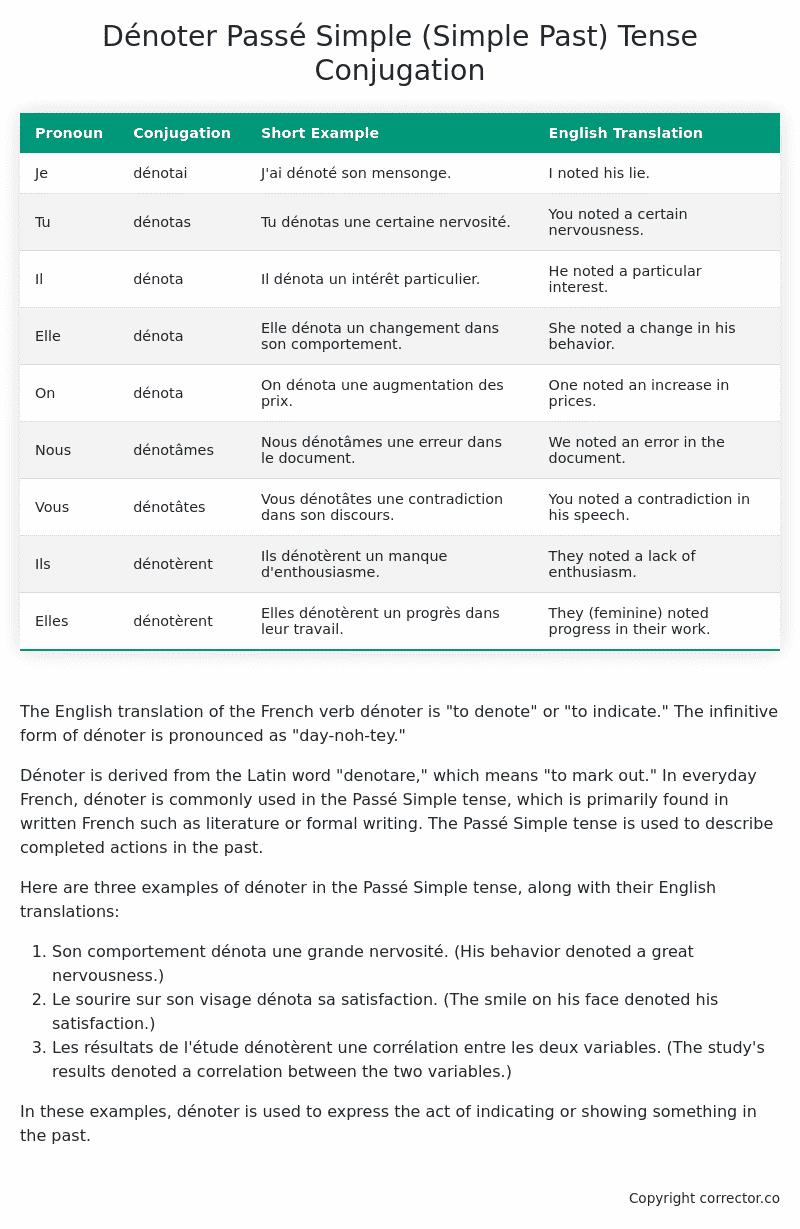Passé Simple (Simple Past) Tense Conjugation of the French Verb dénoter
Introduction to the verb dénoter
The English translation of the French verb dénoter is “to denote” or “to indicate.” The infinitive form of dénoter is pronounced as “day-noh-tey.”
Dénoter is derived from the Latin word “denotare,” which means “to mark out.” In everyday French, dénoter is commonly used in the Passé Simple tense, which is primarily found in written French such as literature or formal writing. The Passé Simple tense is used to describe completed actions in the past.
Here are three examples of dénoter in the Passé Simple tense, along with their English translations:
- Son comportement dénota une grande nervosité. (His behavior denoted a great nervousness.)
- Le sourire sur son visage dénota sa satisfaction. (The smile on his face denoted his satisfaction.)
- Les résultats de l’étude dénotèrent une corrélation entre les deux variables. (The study’s results denoted a correlation between the two variables.)
In these examples, dénoter is used to express the act of indicating or showing something in the past.
Table of the Passé Simple (Simple Past) Tense Conjugation of dénoter
| Pronoun | Conjugation | Short Example | English Translation |
|---|---|---|---|
| Je | dénotai | J’ai dénoté son mensonge. | I noted his lie. |
| Tu | dénotas | Tu dénotas une certaine nervosité. | You noted a certain nervousness. |
| Il | dénota | Il dénota un intérêt particulier. | He noted a particular interest. |
| Elle | dénota | Elle dénota un changement dans son comportement. | She noted a change in his behavior. |
| On | dénota | On dénota une augmentation des prix. | One noted an increase in prices. |
| Nous | dénotâmes | Nous dénotâmes une erreur dans le document. | We noted an error in the document. |
| Vous | dénotâtes | Vous dénotâtes une contradiction dans son discours. | You noted a contradiction in his speech. |
| Ils | dénotèrent | Ils dénotèrent un manque d’enthousiasme. | They noted a lack of enthusiasm. |
| Elles | dénotèrent | Elles dénotèrent un progrès dans leur travail. | They (feminine) noted progress in their work. |
Other Conjugations for Dénoter.
Le Present (Present Tense) Conjugation of the French Verb dénoter
Imparfait (Imperfect) Tense Conjugation of the French Verb dénoter
Passé Simple (Simple Past) Tense Conjugation of the French Verb dénoter (You’re reading it right now!)
Passé Composé (Present Perfect) Tense Conjugation of the French Verb dénoter
Futur Simple (Simple Future) Tense Conjugation of the French Verb dénoter
Futur Proche (Near Future) Tense Conjugation of the French Verb dénoter
Plus-que-parfait (Pluperfect) Tense Conjugation of the French Verb dénoter
Passé Antérieur (Past Anterior) Tense Conjugation of the French Verb dénoter
Futur Antérieur (Future Anterior) Tense Conjugation of the French Verb dénoter
Subjonctif Présent (Subjunctive Present) Tense Conjugation of the French Verb dénoter
Subjonctif Passé (Subjunctive Past) Tense Conjugation of the French Verb dénoter
Subjonctif Imparfait (Subjunctive Imperfect) Tense Conjugation of the French Verb dénoter
Subjonctif Plus-que-parfait (Subjunctive Pluperfect) Tense Conjugation of the French Verb dénoter
Conditionnel Présent (Conditional Present) Tense Conjugation of the French Verb dénoter
Conditionnel Passé (Conditional Past) Tense Conjugation of the French Verb dénoter
Conditionnel Passé II (Conditional Past II) Tense Conjugation of the French Verb dénoter
L’impératif Présent (Imperative Present) Tense Conjugation of the French Verb dénoter
L’impératif Passé (Imperative Past) Tense Conjugation of the French Verb dénoter
L’infinitif Présent (Infinitive Present) Tense Conjugation of the French Verb dénoter
L’infinitif Passé (Infinitive Past) Tense Conjugation of the French Verb dénoter
Le Participe Présent (Present Participle) Tense Conjugation of the French Verb dénoter
Le Participe Passé (Past Participle) Tense Conjugation of the French Verb dénoter
Struggling with French verbs or the language in general? Why not use our free French Grammar Checker – no registration required!
Get a FREE Download Study Sheet of this Conjugation 🔥
Simply right click the image below, click “save image” and get your free reference for the dénoter Passé Simple tense conjugation!

Dénoter – About the French Passé Simple (Simple Past) Tense
Formation
Usage
Narration
Historical Context
Interactions with other tenses
Passé Composé
Imparfait
Conditional and Subjunctive
Summary
I hope you enjoyed this article on the verb dénoter. Still in a learning mood? Check out another TOTALLY random French verb conjugation!


